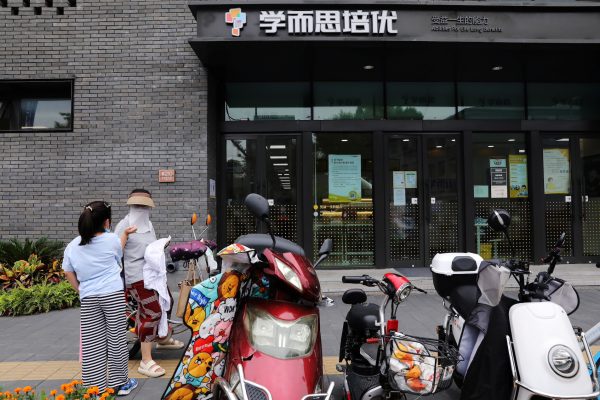Despite the official Chinese Communist Party (CCP) critique of the tutoring companies as elitist, their contribution to inequality within Chinese society is trivial in comparison to institutionalised and CCP-sanctioned instruments like the gaokao (the National College Entrance Examination, which acts as the primary criterion for university admission and de-facto favours middle class youth) and the hukou (the household registration system, which is essentially an ‘internal passport’, preventing Chinese citizens from accessing social services where they have no ‘registration’).
The destruction of leading online tutoring companies, triggering unemployment and dislocation for both students and parents, is the latest assault on some of China’s top tech companies, which started in November 2020 with the targeting of Ant Group.
The most insightful interpretation of this assault is that the government, under the pretext of regulatory ‘rectification’, has decided to curb China’s entrepreneurial capitalism to reaffirm the political pecking order. This rectification is a domestic initiative, aimed at the entrepreneurial component of China’s enterprise sector. In the eyes of the CCP, the entrepreneurial tech companies’ market size, financial success and international prominence — combined with the wealth of their founders — have become incompatible with the CCP’s vision for the Chinese economy.
In China’s corporate pecking order, as studied by Yasheng Huang, state capitalism — defined as the state-owned enterprise (SOE) sector with state–private collaboration in joint ownership and control rights over corporate cash flows — is at the very top. At the bottom is entrepreneurial or arms-length capitalism, which is dependent primarily on entrepreneurial genius and managerial acumen. This layer of capitalism comes closest to the Western model.
The defining characteristic of each is the extent of state control over corporate cash flows. Looking at the targets of the government’s rectification, it is clear that the lower the level of state control, the lower a company’s position in the political pecking order.
First, the targets are entrepreneurial companies, who are not backed by SOEs or major state-owned banks and have sought to avoid such linkages. For example, Ant Group has traditionally funded its consumer loans from small regional banks. But the rectification has compelled Ant Group to fund consumer loans from major state-owned banks, increasing state control rights over the company.
These entrepreneurial companies often operate with greater transparency because of their financial backers, which include world-class private equity groups and international tech companies. Didi is backed by SoftBank Vision Fund — the Japanese conglomerate specialising in tech — and Uber. T3 Chuxing, a competing ride-hailing company, operates in the sphere of state capitalism, as its backers include three SOEs.
Second, the targets are not only leaders in their home market but in many cases are global leaders. New Oriental Education and TAL Educations were global online education leaders within a sector that features no comparable Western players. Ant Group and its local competitor WeChat (which has also had to suspend new user registrations due to ‘regulatory compliance’) are global fintech leaders, particularly in payments. Didi is the global leader in ride-hailing, chasing Uber out of its home market in 2016 and subsequently acquiring a 90 per cent market share.
Unlike Uber, Didi has successfully managed its growth, paving the way for its mega IPO in New York. A listing in New York, rather than Hong Kong or Shanghai, is a shared entrepreneurial ambition because of the more flexible regulatory environment, US investor appetite and global prestige. This kind of global prominence has come to rankle Beijing, as these companies should be ‘lying low’ at the bottom of the political pecking order. One way of denying them international prominence is to prevent them from listing in New York through an opaque cyber security clearance.
Third, though the targets are leaders in their respective technologies, Beijing’s industrial policies do not favour these technologies. Ride-hailing, fintech and online tutoring are consumer services that are not mentioned in Made in China 2025 — the cornerstone of China’s industrial policy. Made in China 2025 defines priority initiatives within 10 key sectors, all of which can be subsumed as advanced manufacturing.
Yet China’s best and most internationally prominent tech companies operate in consumer services. Against this background, the government must be seriously embarrassed by some recent disasters involving its industrial policy champions. For example, the semiconductor manufacturer Tsinghua Unigroup, a prominent state-owned conglomerate at the very top of the political pecking order, collapsed in June 2021 under a mountain of unsustainable debt.
Some observers have suggested that major private real estate companies might become targets of rectification. This is unlikely, as real estate companies tend to operate in the sphere of crony capitalism. They might hover on the brink of bankruptcy, as in the case of the Evergrande Group, one of China’s top real estate developers. But their place in the pecking order is secure.
In China’s entrepreneurial sector, the next rectification targets are likely to be other entrepreneurial companies like Tencent Holdings. Its main product, online video games, was labelled ‘spiritual opium’ by a state-owned publication, although the label was later amended.
Even as hundreds of thousands of jobs are put at risk by the crackdown on online education and tutoring, with billions of dollars in shareholder value being burnt, the government remains undeterred. It believes that entrepreneurial companies have no choice but to succumb to greater state control. At a recent CCP forum, President Xi Jinping praised the ‘progress’ being made against entrepreneurial capitalism, which he called an ‘irrational expansion of capital’. The future of China’s entrepreneurial capitalism, once brilliant, has turned opaque.
Martin Miszerak is a Visiting Lecturer at Renmin Business School, Renmin University, Beijing.

